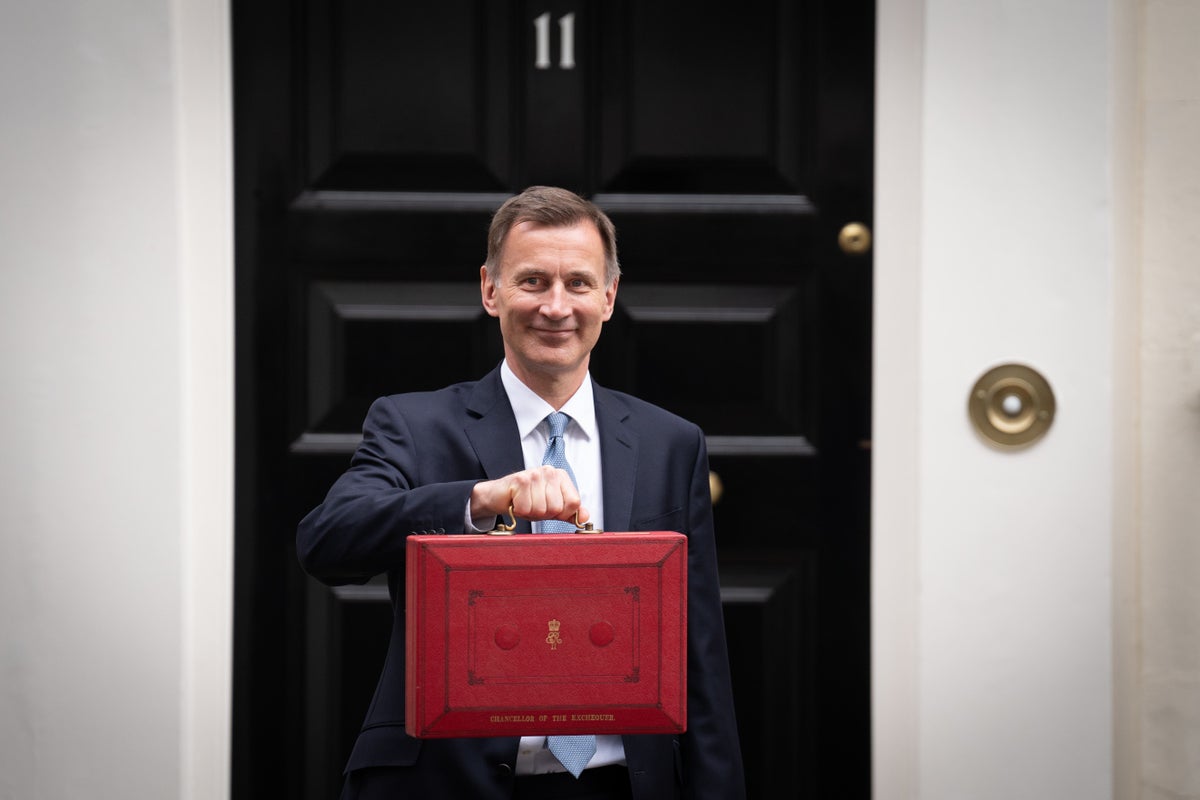
Jeremy Hunt unveiled rapidly falling inflation, free childcare for toddlers, and a tax cut on pensions as he used his first Budget to declare his economic plan “is working”.
Saying the UK economy was “proving the doubters wrong”, the chancellor also announced that Britain will avoid a recession.
He used a £25bn-a-year improvement in the country’s finances to set out a “growth” Budget he said would deliver “better jobs and better opportunities” for the future.
And he told MPs the government was on course to reduce debt, leaving “more money for our public services and a lower burden for future generations”.
Mr Hunt used his first full Budget to:
• Announce that inflation is expected to fall to 2.9 per cent by the end of the year
• Scrap the £1m cap on tax-free pension savings
• Give 30 hours of free childcare to working parents of children between nine months and three years old from 2025
• Extend the energy price guarantee, which caps typical bills at £2,500, for another three months
• Resist demands from Tory MPs to ditch April’s planned rise in corporation tax
Mr Hunt later pledged to “fill the 1 million vacancies that companies up and down the country have, so they can grow faster”.
The prime minister, Rishi Sunak, said the “back to work” Budget would help “more people to find the jobs they want”.
But Sir Keir Starmer said Britain was the “sick man of Europe once again” after years of Tory “managed decline”, as he criticised what he said were “sticking plaster” announcements.
The chancellor also faced accusations that his pensions reforms were a tax cut to the wealthy, just as the overall tax burden is predicted to rise to levels not seen since the 1940s.
And the independent Office for Budget Responsibility (OBR) warned that households are still expected to face the biggest fall in living standards on record.
There was no money for striking public sector workers, but the highly respected Institute for Fiscal Studies (IFS) think tank pointed out that the chancellor had still found £6bn to freeze fuel duties and maintain the 5p-a-litre cut announced last year.
Paul Johnson from the IFS said: “£6bn might have been enough to make an inflation-matching pay offer [for public sector workers] possible this coming year. That’s a political choice. Money for motorists, but not for nurses, doctors and teachers.”
He also said that the previously announced freezing of income tax thresholds, which set the level at which workers start to pay different amounts of tax on their earnings, was “an important part of ... why household incomes are still expected to fall more ... than at any point in living memory”.
On the broader economic picture, he added: “We’re by no means out of the woods yet.”
Mr Hunt also faced criticism over his surprise decision to spend £1.1bn a year on a pensions tax break for the well-off at the same time as the tax burden is expected to reach levels not seen since the end of the Second World War.
The move is designed to prevent doctors from leaving the NHS early, but official figures show it will stop only an estimated 15,000 high earners from leaving the workforce, and the Treasury could not say how many of those would be medics.
Treasury sources insisted it was important to find the “quickest and most effective” solution to the problem, as the health service battles a huge post-Covid backlog. But Labour said the move was a tax cut for “the richest 1 per cent”.
The OBR forecasts that the UK’s tax burden will “reach a post-war high of 37.7 per cent of GDP ... in 2027-28”.
Overall, Mr Hunt’s “back to work” plans, including reforms to pensions and childcare, are forecast to increase the number of people working by around 110,000.
The OBR predicted that the UK would avoid a technical recession – two consecutive quarters of decline – and shrink by 0.2 per cent this year. The economy is then due to grow by 1.8 per cent in 2024. But the OBR has downgraded its growth forecasts for later years slightly, to 2.5 per cent in 2025, down from 2.6 per cent, and to 2.1 per cent in 2026, down from 2.7 per cent.
The OBR forecasts, published alongside the Budget, also predict that house prices will fall by 10 per cent, and that net migration will “settle” at 245,000 a year, it estimates, up from 129,000 in its report last March.
In response to the migration forecast, No 10 said the UK has a “points-based” immigration system, but added: “We want to get net migration down.”
Tory MPs on the right urged Mr Hunt to think again over the corporation tax rise, demanding he cuts the rate in the autumn rather than wait until too close to the election, which is expected to take place in late 2024.
Former Tory minister David Jones told The Independent: “I’d like to see corporation tax reduced as soon as possible. The capital allowances do mitigate the increase, but I’d prefer to see a lower rate. The Conservatives must be the party of low tax.”
Former home secretary Priti Patel said she would ask the chancellor to “keep the wider approach to corporation tax under review”.
But his Budget was welcomed by others on the Tory back benches. Daniel Kawczynski, the MP for Shrewsbury and Atcham, said: “He’s just won us the next election by a narrow majority.”
Dame Meg Hillier, the chair of the Commons public accounts committee, said the pensions changes would “do nothing ... to reverse the exodus of people leaving [the workforce]. It might stop some people in their tracks and make them think, but many will have already made their pension plans.”







